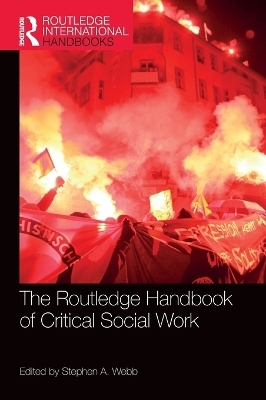
The Routledge Handbook of Critical Social Work
Routledge (Verlag)
978-1-138-57843-2 (ISBN)
Comprised of 48 chapters divided into six parts:
Historical, social, and political influences
Mapping the theoretical and conceptual terrain
Methods of engagement and modes of analysis
Critical contexts for practice and policy
Professional education and socialisation
Future challenges, directions, and transformations
it provides an authoritative guide to theory and method, and the primary debates of today in social work from a critical perspective.
This handbook is a major reference work and the first book to comprehensively map the wide-ranging territory of critical social work. It does so by addressing its conceptual developments, its methodological advances, its value-based front-line practice and as an influence on the policy field. By offering a definitive survey of current academic knowledge as it relates to professional practice, it provides the first comprehensive, up-to-date, definitive work of reference while at the same time identifying emerging, innovative and cutting-edge areas.
Stephen A. Webb is Professor of Social Work at Glasgow Caledonian University. His research interests focus on social work and social theory, with a focus on ethics, power, politics and community. His article on evidence-based practice published in the British Journal of Social Work was the world’s most cited article and the most influential publication in social work over ten years. He is a Fellow of the Academy of Social Sciences.
List of contributors; Foreword: Critical social work and social justice - Jan Fook; Acknowledgements; Introduction: Critical social work and the politics of transformation - Stephen A. Webb; PART I: Historical, social and political influences; Chapter One Welfare words, neoliberalism and critical social work - Paul Michael Garrett; Chapter Two Neoliberal relations of poverty and the welfare state – Sanford F. Shram; Chapter Three Marxist Social Work: an international and historical perspective – Tom Vickers; Chapter Four Critical social work in the U.S.: challenges and conflicts – Michael Reisch; Chapter Five The rise of the global state paradigm: implications for social work – Paul Stepney; PART II: Mapping the theoretical and conceptual terrain; Chapter Six Critical theory and critical social work – Edward Granter; Chapter Seven Reimagining social theory for social work – Christopher Thorpe; Chapter Eight Anarchism and social work – Mark Baldwin; Chapter Nine Relational constructivism and relational social work – Björn Kraus; Chapter Ten Extending Bourdieu for critical social work – Stan Houston; Chapter Eleven Why psychosocial thinking is critical – Liz Frost; Chapter Twelve Feminist contributions to critical social work – Viviene E. Cree and Ruth Philips; Chapter Thirteen The politics of Michel Foucault – Paul Michael Garrett; Chapter Fourteen Resistance, biopolitics and radical passivity – Stephen A. Webb; PART III: Methods of engagement and modes of analysis; Chapter Fifteen Critical race theory and social work – Monique Constance-Huggins; Chapter Sixteen Indigenous peoples and communities: a critical theory perspective – Brent Angell; Chapter Seventeen Postcolonial feminist social work – Anne C. Deepak; Chapter Eighteen Critical discourse analysis and social work – Karen D. Roscoe; Chapter Nineteen Controversy analysis: contributions to the radical agenda – Natalia Farmer; Chapter Twenty Narrative analysis and critical social work – Sam Larsson; PART IV: Critical contexts for practice and policy; Chapter Twenty-One Green social work and political ecologies – Lena Dominelli; Chapter Twenty-Two Securitising social work: counter terrorism, extremism, and radicalisation – Jo Finch and David McKendrick; Chapter Twenty-Three Issues of ageing, social class, and poverty – Malcolm Carey; Chapter Twenty-Four Critical social work in the new urban age – Charlotte Williams; Chapter Twenty-Five Parents organizing a grassroots movement to reform child welfare – David Tobis; Chapter Twenty-Six Incorporating rurality into a critical ethics of intellectual disability care – Lia Bryant and Bridget Garnham; Chapter Twenty-Seven Neoliberal regimes of welfare in Scandinavia – Edgar Marthinsen; Chapter Twenty-Eight Performativity and sociomaterial becoming: what technologies do – Lucas D. Introna; Chapter Twenty-Nine Challenging scapegoating mechanisms: mimetic desire and self-directed groupwork – Stan Houston and Stephen Coulter; Chapter Thirty Vulnerability and the myth of autonomy – Ian Cummins; Chapter Thirty-One Food banks, austerity and critical social work – Sarah Pollock; Chapter Thirty-Two Ageing, veterans and offending: challenges for critical social work – Paul Taylor and Jason Powel; Chapter Thirty-Three "Do you really want this in front of a judge?" Translation and reversibility in practices of age assessment – Calum Lindsey; Chapter Thirty-Four Toward a multispecies home: bedbugs and the politics of non-human relations – Heather Lynch; Chapter Thirty-Five Adoption, child rescue, maltreatment and poverty – June Thoburn and Brigid Featherstone; Chapter Thirty-Six Critical debates in child protection: the production of risk in changing times – Emily Keddell and Tony Stanley; Chapter Thirty-Seven LGBT issues and critical social work – Urban Nothdurfter; PART V: Professional education and socialisation; Chapter Thirty-Eight Promoting activism and critical social work education – Christine Morley; Chapter Thirty-Nine Social work education and the challenge of neoliberal hegemony – Jane Fenton; Chapter Forty Embedding critical reflection across the curriculum – Fiona Gardner; Chapter Forty-One Contesting doxa in social work education – Liz Beddoe; Chapter Forty-Two Insinuating: understanding approaches to critical practice – Cynthia J. Gallop; Chapter Forty-Three Responding to neoliberalism in social work education: A neo-Gramscian approach – John Wallace and Bob Pease; PART VI: Future challenges, directions and transformations; Chapter Forty-Four Reprioritising social work practice: towards a reconnection of the personal and the social – Peter Beresford and Suzy Croft; Chapter Forty-Five Responding to political polarization: the new social work radicalism – Iain Ferguson; Chapter Forty-Six Popular social work – Michael Lavalette; Chapter Forty-Seven Challenging harmful political contexts through activism – Linda Briskman; Chapter Forty-Eight Imperialism, colonialism and a Marxist epistemology of 'critical peace' – Vasilios Ioakimidis and Nicos Trimikliniotis; Index
| Erscheinungsdatum | 24.01.2019 |
|---|---|
| Reihe/Serie | Routledge International Handbooks |
| Zusatzinfo | 7 Tables, black and white; 7 Line drawings, black and white; 7 Illustrations, black and white |
| Verlagsort | London |
| Sprache | englisch |
| Maße | 174 x 246 mm |
| Gewicht | 1300 g |
| Themenwelt | Sachbuch/Ratgeber ► Gesundheit / Leben / Psychologie |
| Sozialwissenschaften ► Pädagogik ► Sozialpädagogik | |
| Sozialwissenschaften ► Politik / Verwaltung ► Politische Systeme | |
| Sozialwissenschaften ► Soziologie | |
| ISBN-10 | 1-138-57843-6 / 1138578436 |
| ISBN-13 | 978-1-138-57843-2 / 9781138578432 |
| Zustand | Neuware |
| Haben Sie eine Frage zum Produkt? |
aus dem Bereich


